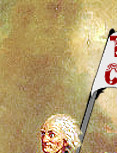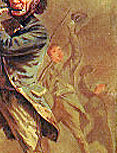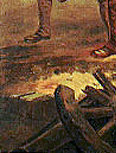|
Beard's
early writings reflected his involvement in the political
vision of the Progressive movement, of which more shortly.
In 1917, after US entry in World War I (which Beard
supported), he resigned from Columbia University in
protest over restrictions on academic freedom, which
the wartime climate made possible. He betook himself
to a dairy farm in Connecticut, which he ran successfully.
After
the war, Beard wrote many essays, a general history
of the United States, and several books which attempted
to deal with the economic crisis which began in 1929.
He was a power to be reckoned with, even if his ideas
were deemed controversial by some, and liberals and
Progressives loved him – until he came to question the
wisdom of Franklin Roosevelt in the field of foreign
policy. In 1968, the arch-Establishment historian Richard
Hofstadter called Beard's reputation "an imposing
ruin": "The east wing, inspired by historical
relativism… is entirely neglected. The west wing,
dedicated to continental isolationism, looks like a
late and relatively hasty addition; a jerry-built affair,
now a tattered shambles, it is nonetheless occupied
from time to time by transient and raucous tenants,
of whom, one is sure, the original owner would have
disapproved."1 Very literary.
As
one of those raucous tenants, I have to say that, if
I were a betting man, I would bet that twenty or fifty
years from now – if there is an American civilization
whose inmates even care to study their own history – more people will read Charles Beard than Richard Hofstadter.
ECONOMIC
'DETERMINISM'
Beard's
early reputation rested on his book on the Constitutional
Convention. The Constitution itself and the Courts that
interpreted it seemed, eighty some years ago, to be
bastions of conservatism bent on maintaining an unjust
economic order. Progressives welcomed Beard's work as
reducing the Constitution's authority by showing that
the founders had economic motives just like everyone
else. Beard's critics considered him a vile Marxist.
Forrest MacDonald, perhaps the best of the commentators
on the Constitution – and Beard's view of it, accepts
that there were economic motivations at work,
but finds Beard guilty of gross oversimplification and
misunderstanding of the actual politics of 1787.
New
Left historian William Appleman Williams – on whom Beard
had an obvious important influence – wrote that Beard
was chiefly influenced by James Madison, Brooks Adams,
and Marx as regards the relationship of politics and
economics. Beard's influence does not stop with Williams.
The late Murray Rothbard – libertarian economist and
historian – always acknowledged a debt to Beard.
Beard's
method, then, transcended the intentions of the Progressive
moment. I think it is on best display in his book on
Jeffersonian Democracy. Political figures have economic
interests and motives and will act on them when
they can. There is nothing in that which requires the
help of Marx. This common sense approach, which dispenses
with the clumsy apparatus which Marx welded together
out of incompatible spare parts, can be found in the
Scottish Enlightenment, the American founders, and early
British and French liberalism. Williams writes that
"Economic determinism is an open-ended system of
causal analysis. Marxism, as generally understood and
as used by the critics of Beard, is a closed system
of utopian prophecy."2
BEARD'S
CHANGE OF FRONT
Of
course, a sound view of economic theory would prevent
various errors in applying the common-sense strategy
of looking for economic motives, where they exist. I
cannot say that Beard's economic ideas ever rose above
the notion that extensive state regulation might be
needed to offset problems allegedly built into the market
economy. His works of the early 1930s, such as The
Open Door at Home (1934), look towards an American
corporatism and avoidance of foreign war. Williams writes
that Beard's The
Idea of National Interest (1934) said of foreign
policy that "(1) it is intimately connected with
domestic affairs, (2) empires are not built in fits
of absent-mindedness, and (3) expansion does not in
and of itself solve problems, and often complicates
and deepens them."3
His
concern over the direction of US foreign policy moved
Beard into cooperation with the anti-New Deal Old Right
and it is this, which – contrary to Hofstadter
– makes his later work so interesting and important.
Like a lot of other people, Beard reacted badly to FDR's
turn toward activist foreign policy in 1937. In 1939
Beard wrote Giddy Minds and Foreign Quarrels,
which revealed his new concern. The title came from
Shakespeare's Henry
IV, in which the young king is advised, "Be
it thy course , to busy giddy minds with foreign quarrels,
that action, hence borne out, may waste the memory of
the formers days." In this short book [87 pp.],
Beard reviewed the claims made for economic imperialism
in 1898 in the name of the Open Door (the "inner
doctrine," as I like to call it, which was never
a big secret). He concluded that the undertaking had
been enormously expensive for the nation and profitable
to only a few people.
Beard
also had a go at what I call the "outer doctrine"
– purely ideological constructs grounded, it seemed,
on not much at all. He paints an unkind picture of American
"internationalism": "The lines of the
Wilsonian creed of world interventionism and adventurism
are in substance: Imperialism is bad (well, partly);
every nation must have a nice constitutional government,
more or less like ours; if any government dislikes the
settlement made at Versailles it must put up its guns
and sit down with its well-armed neighbors for a 'friendly'
conference; trade barriers are to be lowered and that
will make everybody round the globe prosperous (almost,
if not entirely); backward peoples are to be kept in
order but otherwise treated nicely, as wards; the old
history, full of troubles, is to be closed; brethren,
and presumably sisters, are to dwell together in unity;
everything in the world is to be managed as decorously
as a Baptist convention presided over by the Honorable
Cordell Hull; if not, we propose to fight disturbers
everywhere (well, nearly everywhere)."4
With
the addition of a few new clauses – border disputes
between oil-producing nations must never be settled
by force without Uncle Sam's permission, racism and
ethnic insensitivity will be stamped out at all cost
everywhere – we have the creed of several recent
administrations.
SMOKE
AND MIRRORS
Beard
had the wit to see behind the political labels of his
day. He duly noted that the Republican administrations
of the 1920s, generally reckoned as "isolationist,"
had intervened at will: "They turned the Government
of the United States into a big drumming agency for
pushing the sale of goods and the lending of money abroad,
and they talked vociferously about the open doors everywhere,
except at home."5
He wrote that FDR's requests for increased military
spending only made sense on the assumption that US leaders
intended to participate in the next European war.
In
America
In Midpassage, vol. I (1939), written with his
wife Mary R. Beard, Beard sketched out his understanding
of the foreign policy alternatives. One was unilateral
imperialism, which he somewhat awkwardly called "imperial
isolationism." This was the program of Open Door
enthusiasts who wished to avoid commitments to other
powers. Another was "collective internationalism"
– the Wilsonian program of a concert of imperial
powers to keep order and pursue armed philanthropies.
A third alternative – to which Beard adhered –
was that of the "continental" or "American
civilization" school, which wished to defend the
United States themselves while avoiding distant quarrels
overseas.
LAST
WORDS
Beard
lived to see American involved in what he believed was
an unnecessary war. The Pacific war had been entirely
avoidable in terms of real US interests (propaganda
about the China market notwithstanding), but pressure
on Japan helped ease the administration's way into the
European war by way of an Asian war. In his last two
major works, American
Foreign Policy in the Making, 1932-1940 (1946),
and President
Roosevelt and the Coming of the War, 1941 (1948)
sought to nail down the case against FDR's policy and
the duplicitous way in which he pursued it. It was a
heroic effort on the part of a great historian at the
end of his life. It is easy to forgive his residual
Progressivism in light of such an achievement.
AND
NOW FOR SOMETHING COMPLETELY DIFFERENT
A
few years ago, I wrote that if the fashion for humanitarian
interventions really took hold, we could look forward
to seeing US Marines manning soup kitchens and hanging
drywall in places like Somalia and Haiti. Now reality
seems to have overtaken me. To paraphrase Marx, history
repeats itself, first as low comedy and then as mindless
farce. I hope the recently reported "concrete bombs"
are a joke – otherwise, the matter raises a number
of rude questions. (See Karla
Solheim, "Smart Bombs or Rocks for Brains?"
MOJO Wire, 5 November 1999.
If
American planes are really dropping "smart"
bombs made of concrete on Iraqi targets, what form do
they take? I mean, if they're just dropping 90 lb. bags
of Portland cement out of airplanes, I can't see what
good it would do, even from the standpoint of the Imperial
Brain Trust. Create a dust storm? They've already got
dust in Iraq. So, presumably, the concrete has to be
poured in forms and left to set up, in which case, I
want to know if they tie steel in it. Do the ironworkers
get union-scale for tying the steel? How do you install
a laser guidance system in a big-ole piece of tie-beam?
It's like something out of the Monty Python self-defense
sketch – "Release the sixteen-tonne weight."
I
hope it's only a hoax, because the philosophical implications
are staggering. It will give the poor Marxists something
to do. They've been a bit beside themselves ever since
"their rowdy friends settled down" in the
eastern Bloc. I can hear them now: "The latest
US tactic against Iraq represents a distillation of
the forces and relations of production under late capitalism.
It is thus a concretization of suppressed social
struggles, which attempts to cement permanently
the illusory class-collaboration of the current situation."
And
whose "material interests" are served by the
use of this interesting material? Is there competitive
bidding? Can I pour some concrete slabs in the backyard
and ship them up to Washington at the generous 2000%
defense mark-up? Or do they get their big concrete chunks
out of failed public housing projects? There's something
inspiring in that. My suggestion: break up the Roosevelt
memorial and drop that – but not on the Iraqis, they
don't deserve it.
Are
there concrete bombs? Have I been taken in by a hoax?
Hard to say. The people that run this country are capable
of just about anything. Anyway, the symbolism is cosmic:
concrete bombs to implement American abstractions!
[1] Richard Hofstadter, The
Progressive Historians: Turner, Beard, Parrington
(New York, 1968) p. 344.
[2] William Appleman Williams, "A Note on Charles
Beard's Search for a General Theory of Causation"
in History
as a Way of Learning (New York, 1973), p. 176.
[3] William Appleman Williams, "Charles Austin
Beard: The Intellectual as Tory-Radical" in Harvey
Goldberg, ed., American Radicals (New York, 1957),
p. 305.
[4] Charles A. Beard, Giddy Minds and Foreign Quarrels
(New York, 1939), pp. 24-25.
[5] Ibid., 26.
Please
Support Antiwar.com
A
contribution of $20 or more gets you a copy of Justin
Raimondo's Into the Bosnian Quagmire: The Case Against
U.S. Intervention in the Balkans, a 60-page booklet
packed with the kind of intellectual ammunition you
need to fight the lies being put out by this administration
and its allies in Congress. Send contributions to
Antiwar.com
520 S. Murphy Avenue, #202
Sunnyvale, CA 94086
or
Contribute Via our Secure Server
Credit Card Donation Form

|









